亚洲开发银行采购指南
- 格式:ppt
- 大小:271.00 KB
- 文档页数:19
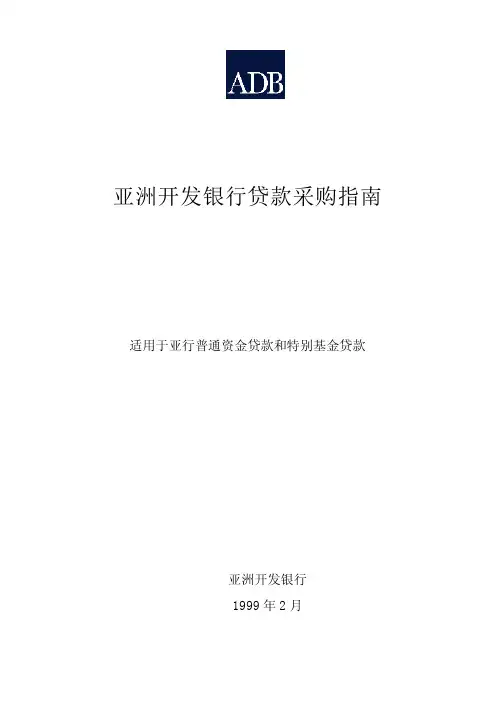

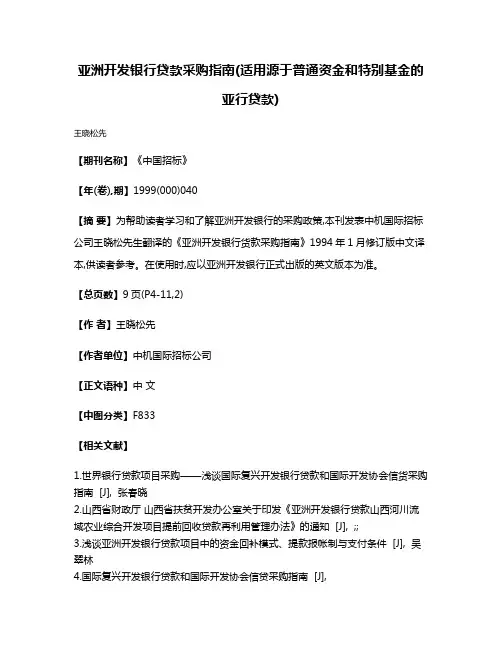
亚洲开发银行贷款采购指南(适用源于普通资金和特别基金的
亚行贷款)
王晓松先
【期刊名称】《中国招标》
【年(卷),期】1999(000)040
【摘要】为帮助读者学习和了解亚洲开发银行的采购政策,本刊发表中机国际招标公司王晓松先生翻译的《亚洲开发银行货款采购指南》1994年1月修订版中文译本,供读者参考。
在使用时,应以亚洲开发银行正式出版的英文版本为准。
【总页数】9页(P4-11,2)
【作者】王晓松先
【作者单位】中机国际招标公司
【正文语种】中文
【中图分类】F833
【相关文献】
1.世界银行贷款项目采购——浅谈国际复兴开发银行贷款和国际开发协会信货采购指南 [J], 张春晓
2.山西省财政厅山西省扶贫开发办公室关于印发《亚洲开发银行贷款山西河川流域农业综合开发项目提前回收贷款再利用管理办法》的通知 [J], ;;
3.浅谈亚洲开发银行贷款项目中的资金回补模式、提款报帐制与支付条件 [J], 吴翠林
4.国际复兴开发银行贷款和国际开发协会信贷采购指南 [J],
5.世界银行、亚洲开发银行、亚洲基础设施投资银行以及新开发银行贷款项目商业机会论坛在京举办 [J],
因版权原因,仅展示原文概要,查看原文内容请购买。
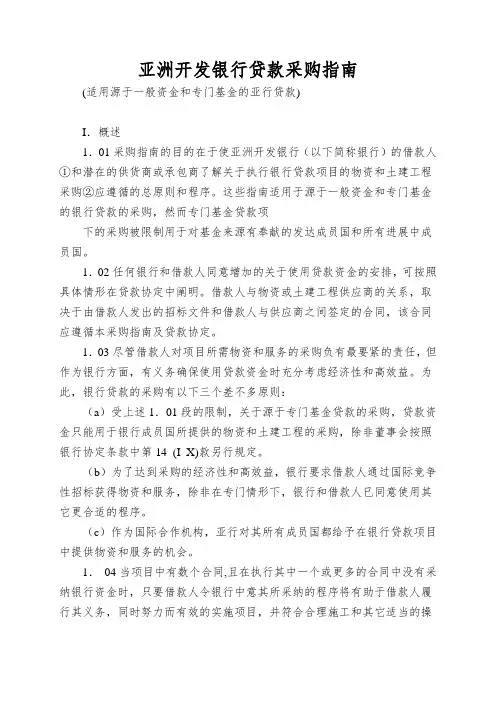
亚洲开发银行贷款采购指南(适用源于一般资金和专门基金的亚行贷款)I.概述1.01采购指南的目的在于使亚洲开发银行(以下简称银行)的借款人①和潜在的供货商或承包商了解关于执行银行贷款项目的物资和土建工程采购②应遵循的总原则和程序。
这些指南适用于源于一般资金和专门基金的银行贷款的采购,然而专门基金贷款项下的采购被限制用于对基金来源有奉献的发达成员国和所有进展中成员国。
1.02任何银行和借款人同意增加的关于使用贷款资金的安排,可按照具体情形在贷款协定中阐明。
借款人与物资或土建工程供应商的关系,取决于由借款人发出的招标文件和借款人与供应商之间签定的合同,该合同应遵循本采购指南及贷款协定。
1.03尽管借款人对项目所需物资和服务的采购负有最要紧的责任,但作为银行方面,有义务确保使用贷款资金时充分考虑经济性和高效益。
为此,银行贷款的采购有以下三个差不多原则:(a)受上述1.01段的限制,关于源于专门基金贷款的采购,贷款资金只能用于银行成员国所提供的物资和土建工程的采购,除非董事会按照银行协定条款中第14 (I X)款另行规定。
(b)为了达到采购的经济性和高效益,银行要求借款人通过国际竞争性招标获得物资和服务,除非在专门情形下,银行和借款人已同意使用其它更合适的程序。
(c)作为国际合作机构,亚行对其所有成员国都给予在银行贷款项目中提供物资和服务的机会。
1.04当项目中有数个合同,且在执行其中一个或更多的合同中没有采纳银行资金时,只要借款人令银行中意其所采纳的程序将有助于借款人履行其义务,同时努力而有效的实施项目,并符合合理施工和其它适当的操作需要,借款人可在这些合同中采纳其自己的采购程序。
任何全部或部分使用贷款资金的合同必须使用银行的采购程序。
1.05为确保高效益而采纳的国际竞争性招标采购程序,在本指南第I I章和第IV章中有所描述;第III章则阐述了在何种情形下采纳哪种方法,比国际竞争性招标更经济有效。
任何这些方法的使用,应在有关项目的贷款协定中列明。
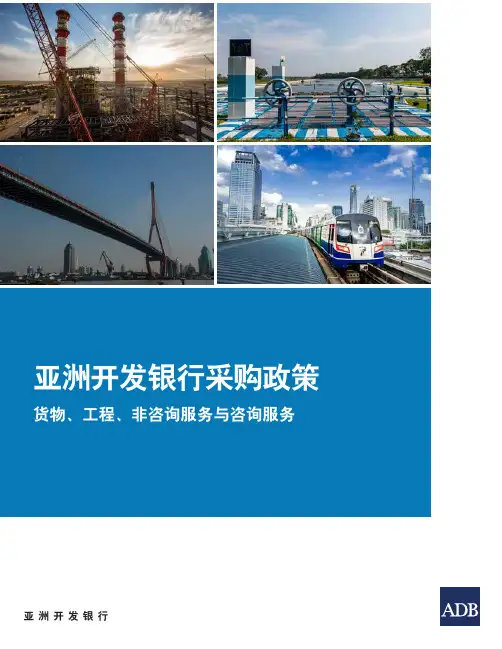
亚洲开发银行亚洲开发银行采购政策货物、工程、非咨询服务与咨询服务亚洲开发银行非商业性使用-禁止演绎政府间组织3.0版知识共享许可协议6 ADB Avenue, Mandaluyong City, 1550 Metro Manila, Philippines(菲律宾马尼拉)电话:+63 2 632 4444;传真:+63 2 636 2444部分版权所有。
2017年出版。
ISBN 978-92-9261-246-7(印刷) 978-92-9261-247-4 (e-ISBN)出版物库存编号:TIM189447-2/10.22617/TIM189447-2亚洲开发银行(亚行)不担保本出版物中所含数据的准确性,而且对使用这些数据所产生的后果不承担任何责任。
本出版物中提及的具体公司或制造商产品并非暗示亚行认为该公司或制造商产品优于未提及的类似性质的其他公司或制造商产品,并予以认可或推荐。
在本出版物中指称或引用某个特定版图或地理区域时,或使用“国家”一词时,不代表亚行意图对该版图或区域的法律地位或其他地位的任何评判。
本出版物采用“署名-非商业性使用-禁止演绎政府间组织3.0版知识共享许可协议” (CC BY-NC-ND 3.0 IGO) /licenses/by-nc-nd/3.0/igo/.使用本出版物中的内容即表示同意遵守上述许可协议的条款。
关于本出版物的署名与使用许可,请登录https://www.亚行.org/terms-use#openaccess本知识共享许可不适用于本出版物中版权不归亚行所有的资料。
如果相关资料归其他信息源所有,请联络该信息源的版权所有人或出版商申请复制许可。
亚行对因使用此类资料所产生的任何索赔不承担责任。
如对本出版物内容有任何疑问或建议,或希望就不适用于上述条款的预期用途获得版权许可,或申请亚行徽标的使用许可,请联系pubsmarketing@。
注:在本出版物中,“$”表示美元。
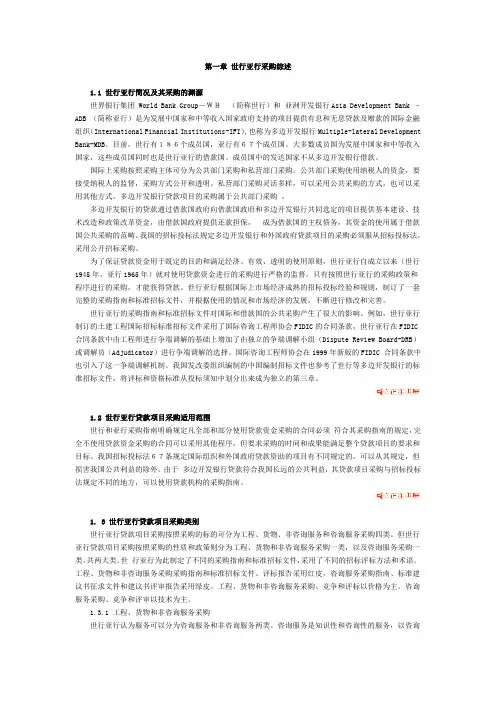
第一章世行亚行采购综述1.1 世行亚行简况及其采购的渊源世界银行集团 World Bank Group-WB(简称世行)和亚洲开发银行Asia Development Bank –ADB (简称亚行)是为发展中国家和中等收入国家政府支持的项目提供有息和无息贷款及赠款的国际金融组织(International Financial Institutions-IFI),也称为多边开发银行Multiple-lateral Development Bank-MDB。
目前,世行有186个成员国,亚行有67个成员国。
大多数成员国为发展中国家和中等收入国家,这些成员国同时也是世行亚行的借款国。
成员国中的发达国家不从多边开发银行借款。
国际上采购按照采购主体可分为公共部门采购和私营部门采购。
公共部门采购使用纳税人的资金,要接受纳税人的监督,采购方式公开和透明。
私营部门采购灵活多样,可以采用公共采购的方式,也可以采用其他方式。
多边开发银行贷款项目的采购属于公共部门采购。
多边开发银行的贷款通过借款国政府向借款国政府和多边开发银行共同选定的项目提供基本建设、技术改造和政策改革资金,由借款国政府提供还款担保,成为借款国的主权债务,其资金的使用属于借款国公共采购的范畴。
我国的招标投标法规定多边开发银行和外国政府贷款项目的采购必须服从招标投标法,采用公开招标采购。
为了保证贷款资金用于既定的目的和满足经济、有效、透明的使用原则,世行亚行自成立以来(世行1945年,亚行1965年)就对使用贷款资金进行的采购进行严格的监督,只有按照世行亚行的采购政策和程序进行的采购,才能获得贷款。
世行亚行根据国际上市场经济成熟的招标投标经验和规则,制订了一套完整的采购指南和标准招标文件,并根据使用的情况和市场经济的发展,不断进行修改和完善。
世行亚行的采购指南和标准招标文件对国际和借款国的公共采购产生了很大的影响。
例如,世行亚行制订的土建工程国际招标标准招标文件采用了国际咨询工程师协会FIDIC的合同条款,世行亚行在FIDIC 合同条款中由工程师进行争端调解的基础上增加了由独立的争端调解小组(Dispute Review Board-DRB)或调解员(Adjudicator)进行争端调解的选择。
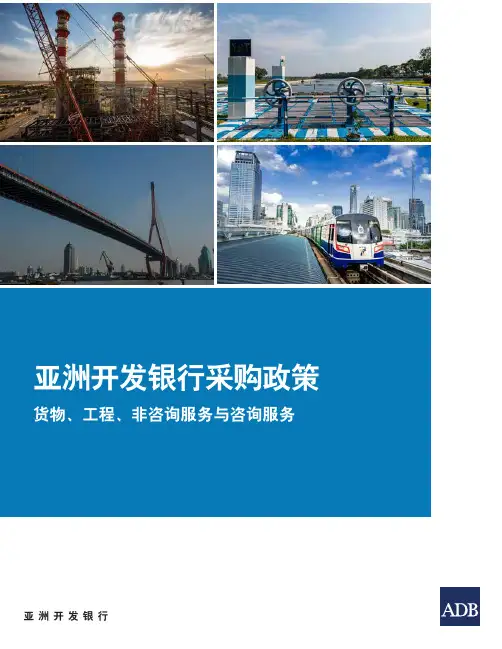
亚洲开发银行亚洲开发银行采购政策货物、工程、非咨询服务与咨询服务亚洲开发银行非商业性使用-禁止演绎政府间组织3.0版知识共享许可协议6 ADB Avenue, Mandaluyong City, 1550 Metro Manila, Philippines(菲律宾马尼拉)电话:+63 2 632 4444;传真:+63 2 636 2444部分版权所有。
2017年出版。
ISBN 978-92-9261-246-7(印刷) 978-92-9261-247-4 (e-ISBN)出版物库存编号:TIM189447-2/10.22617/TIM189447-2亚洲开发银行(亚行)不担保本出版物中所含数据的准确性,而且对使用这些数据所产生的后果不承担任何责任。
本出版物中提及的具体公司或制造商产品并非暗示亚行认为该公司或制造商产品优于未提及的类似性质的其他公司或制造商产品,并予以认可或推荐。
在本出版物中指称或引用某个特定版图或地理区域时,或使用“国家”一词时,不代表亚行意图对该版图或区域的法律地位或其他地位的任何评判。
本出版物采用“署名-非商业性使用-禁止演绎政府间组织3.0版知识共享许可协议” (CC BY-NC-ND 3.0 IGO) /licenses/by-nc-nd/3.0/igo/.使用本出版物中的内容即表示同意遵守上述许可协议的条款。
关于本出版物的署名与使用许可,请登录https://www.亚行.org/terms-use#openaccess本知识共享许可不适用于本出版物中版权不归亚行所有的资料。
如果相关资料归其他信息源所有,请联络该信息源的版权所有人或出版商申请复制许可。
亚行对因使用此类资料所产生的任何索赔不承担责任。
如对本出版物内容有任何疑问或建议,或希望就不适用于上述条款的预期用途获得版权许可,或申请亚行徽标的使用许可,请联系pubsmarketing@。
注:在本出版物中,“$”表示美元。
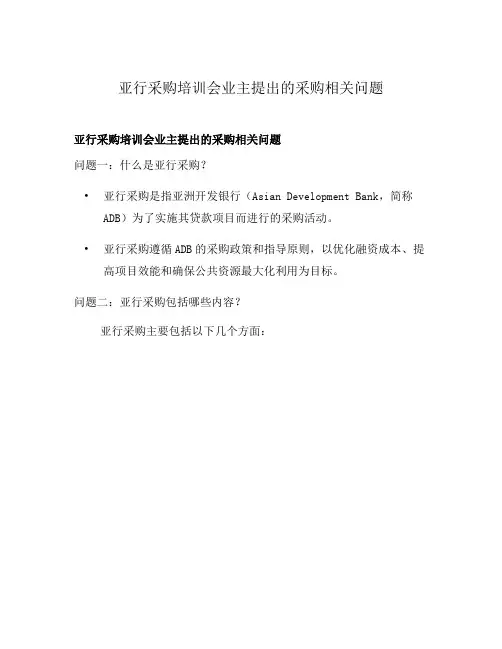
亚行采购培训会业主提出的采购相关问题亚行采购培训会业主提出的采购相关问题问题一:什么是亚行采购?•亚行采购是指亚洲开发银行(Asian Development Bank,简称ADB)为了实施其贷款项目而进行的采购活动。
•亚行采购遵循ADB的采购政策和指导原则,以优化融资成本、提高项目效能和确保公共资源最大化利用为目标。
问题二:亚行采购包括哪些内容?亚行采购主要包括以下几个方面:1. 预先合格性:亚行对参与采购的供应商和承包商会进行预先审查,以确保其具备相应的资质和能力。
2. 采购方法:亚行采购采用公开招标、国际竞争性谈判、国内竞争性谈判等多种采购方法,以达到最佳的供应商选择效果。
3. 采购文件:亚行会发布相应的采购文件,包括招标公告、投标邀请、采购说明书等,供供应商和承包商参考和遵循。
4. 投标和评标过程:亚行采购对符合条件的投标进行评标,以确保选择最合适的供应商或承包商。
5. 合同管理:亚行采购完成后,会与中标供应商或承包商签订合同,并进行后续的合同管理和监督。
问题三:亚行采购有哪些特点?亚行采购具有以下特点:1. 透明公正:亚行采购过程公开透明,所有相关信息都会及时发布,并且采购评标过程严格遵守公正、公平原则。
2. 效能优先:亚行采购旨在提高项目效能,因此在选择供应商或承包商时,不仅考虑价格因素,还考虑其提供的产品或服务的质量和性能。
3. 保护环境和社会:亚行采购注重环境和社会可持续发展,对供应商或承包商的环境和社会责任有一定要求。
4. 风险管理:亚行采购强调风险管理,对可能存在的风险进行评估和控制,以确保项目的顺利进行。
问题四:如何参与亚行采购?要参与亚行采购,供应商或承包商需要按照以下步骤进行:1.注册:供应商或承包商需要在亚行的采购门户网站上注册,并填写相关信息。
2.招标公告:参与亚行采购的供应商或承包商需要关注亚行发布的相关招标公告。
3.准备文件:根据招标文件要求,供应商或承包商需要准备相应的投标文件。

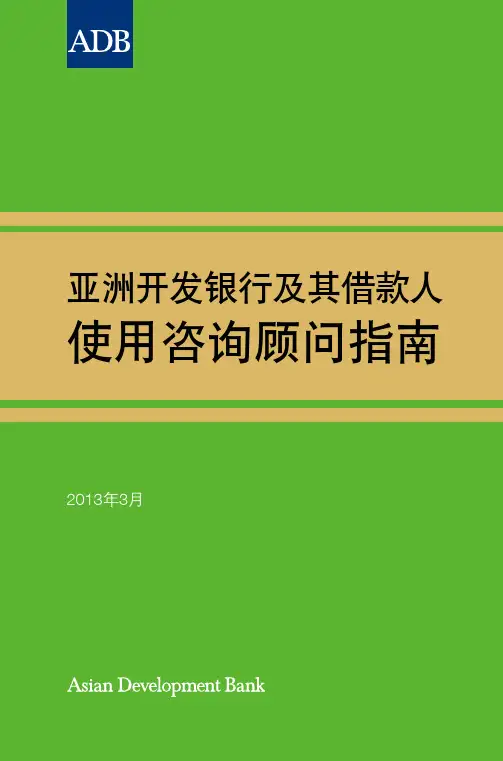

Procurement Guidelines April 2006 ---by Huang CONTENTSI.INTRODUCTION11.1Purpose11.2General Considerations21.5Applicability of Guidelines31.6Eligibility41.9Advance Contracting and RetroactiveFinancing61.10Joint Ventures61.11ADB Review61.12Misprocurement71.13References to ADB71.14Fraud and Corruption81.16Procurement Plan10 II.INTERNATIONAL COMPETITIVE BIDDING13A.General132.1Introduction132.2Type and Size of Contracts132.6Two-Stage Bidding142.7Notification and Advertising162.9Prequalification of Bidders16B.Bidding Documents182.11General182.13Validity of Bids and Bid Security192.15Language202.16Clarity of Bidding Documents202.19Standards212.20Use of Brand Names212.21Pricing222.24Price Adjustment232.26Transportation and Insurance232.28Currency Provisions242.29Currency of Bid252.31Currency Conversion for Bid Comparison252.32Currency of Payment262.34Terms and Methods of Payment262.37Alternative Bids272.38Conditions of Contract272.39Performance Security282.41Liquidated Damages and Bonus Clauses292.42Force Majeure292.43Applicable Law and Settlement of Disputes29C.Bid Opening, Evaluation, and Award of Contract302.44Time for Preparation of Bids302.45Bid Opening Procedures302.46Clarifications or Alterations of Bids312.47Confidentiality312.48Examination of Bids312.49Evaluation and Comparison of Bids322.55Domestic Preferences342.57Extension of Validity of Bids342.58Postqualification of Bidders352.59Award of Contract352.60Publication of the Award of Contract352.61Rejection of All Bids362.65Debriefing37D.Modified ICB372.66Operations Involving a Program of Imports372.68Procurement of Commodities382.69Repeat Order39 III.OTHER METHODS OF PROCUREMENT413.1General413.2Limited International Bidding413.3National Competitive Bidding423.5Shopping433.6Direct Contracting433.8Force Account453.9Procurement from Specialized Agencies453.10Procurement Agents463.11Inspection Agents463.12Procurement in Loans to FinancialIntermediaries463.13Procurement under BOO/BOT/BOOT, Concessionsand Similar Private Sector Arrangements473.14Performance-Based Procurement483.16Procurement under Loans Guaranteed by ADB493.17Community Participation in Procurement493.18Procurement under Disaster and EmergencyAssistance50 APPENDICES51Appendix 1:ADB Review of Procurement Decisions511.Scheduling of Procurement512.Prior Review515.Post Review54Appendix 2:Domestic Preferences561.Preference for Domestically ManufacturedGoods567.Preference for Domestic Contractors58Appendix 3:Guidance to Bidders601.Purpose602.Responsibility for Procurement603.ADB’s Role60rmation on Bidding616.Bidder’s Role6210.Confidentiality6311.Action by ADB6315.Debriefing64I.INTRODUCTIONPurpose1.1The purpose of these Guidelines is to inform those carrying out a project that is financed in whole or in part by a loan from the Asian Development Bank (ADB), ADB-financed grant, or ADB-administered funds,1 of the policies that govern the procurement of goods, works, and services (other than consultant services)2 required for the project. The financing agreement governs the le-gal relationships between the borrower3 and ADB, and the Guide-lines are made applicable to procurement of goods and works for the project, as provided in the agreement. The rights and obliga-tions of the borrower and the providers of goods and works for the project are governed by the bidding documents, and by the contracts signed by the borrower with the providers of goods and works, and not by these Guidelines or the financing agreements. No party other than the parties to the financing agreement shall1For the purpose of these Guidelines, financing by ADB includes financing by ADB-adminis-tered funds.2For the selection and engagement of consultants, see Guidelines on the Use of Consultants by Asian Development Bank and its Borrowers. References to “goods and works” in these procurement Guidelines include related services such as transportation, insurance, installa-tion, commissioning, training, and initial maintenance. The provisions of these procure-ment Guidelines also apply to services, such as drilling, mapping, and similar operations. 3The term “borrower” as used in these Guidelines includes recipients of ADB-financed grants and ADB-administered funds, and also refers to the executing agency for the project. In some cases, the borrower acts only as an intermediary, and the project is carried out by another agency or entity, in which case references in these Guidelines to the borrower include such agencies and entities, as well as sub-borrowers under onlending arrangements.derive any rights therefrom or have any claim to the proceeds of the financing.General Considerations1.2The responsibility for the implementation of the project, and therefore for the award and administration of contracts under the project, rests with the borrower.ADB, for its part, has the obligation to ensure that the proceeds of its financing are used with due atten-tion to considerations of economy and efficiency. While in practice the specific procurement rules and procedures to be followed in the implementation of a project depend on the circumstances of the particular case, five basic principles generally guide ADB requirements:(a)subject to the qualification stated in paragraph 2.11with regard to procurement under loans or grants fromSpecial Funds resources, the proceeds of ADB financingcan be used only for procurement of goods and workssupplied from, and produced in, member countries ofADB, except in any case in which the Board of Directorsdetermines otherwise under Article 14(ix) of the Articlesof Agreement of ADB;(b)the need for economy and efficiency in the implemen-tation of the project, including the procurement of thegoods and works involved;(c)ADB’s interest in giving all eligible bidders from devel-oped and developing countries4 the same informationand equal opportunity to compete in providing goodsand works financed by ADB;(d)ADB’s interest in encouraging the development ofdomestic contracting and manufacturing industries inthe country of the borrower; and4See para. 1.6, 1.7, and 1.8.(e)the importance of transparency in the procurementprocess.1.3Open competition is the basis for efficient public procure-ment. Borrowers shall select the most appropriate method for the specific procurement. In most cases, international competitive bidding (ICB), properly administered, and with the allowance for preferences for domestically manufactured goods and, where appropriate, for domestic contractors5 for works under prescribed conditions is the most appropriate method. In most cases, there-fore, ADB requires its borrowers to obtain goods, works and services through ICB open to eligible suppliers and contractors.6 Section II of these Guidelines describes the procedures for ICB.1.4Where ICB is not the most appropriate method of procure-ment, other methods of procurement may be used. Section III describes these other methods of procurement and the circum-stances under which their application would be more appropriate. The particular methods that may be followed for procurement under a given project are provided for in the financing agreement. The specific contracts to be financed under the project, and their method of procurement, consistent with the financing agreement, are specified in the procurement plan as indicated in paragraph 1.16 of these Guidelines.Applicability of Guidelines1.5The procedures outlined in these Guidelines apply to all contracts for goods and works financed in whole or in part by ADB.7 For the procurement of those contracts for goods and works not financed by ADB, the borrower may adopt other procedures.5For purposes of these Guidelines, “contractor” refers only to a firm providing construction services.6See para. 1.6, 1.7, and 1.8.7This includes those cases where the borrower employs a procurement agent under para.3.10.In such cases ADB shall be satisfied that the procedures to be used will fulfill the borrower’s obligations to cause the project to be carried out diligently and efficiently, and that the goods and works to be procured:(a)are of satisfactory quality and are compatible with thebalance of the project;(b)will be delivered or completed in timely fashion; and(c)are priced so as not to affect adversely the economicand financial viability of the project.Eligibility1.6To foster competition ADB permits bidders from all eligible member countries to offer goods, works, and services for ADB-financed projects.8 Any conditions for participation shall be limited to those that are essential to ensure the bidder’s capability to fulfill the contract in question.1.7In connection with any contract to be financed in whole or in part by ADB, ADB does not permit a borrower to deny the par-ticipation of a bidder for reasons unrelated to its capability and resources to successfully perform the contract; nor does it permit a borrower to disqualify any bidder for such reasons. Consequently, borrowers should carry out due diligence on the technical and financial qualifications of bidders to be assured of their capabili-ties in relation to the specific contract.1.8As exceptions to the foregoing:(a)Firms of a country or goods manufactured in a countrymay be excluded if, by an act of compliance with a 8See para. 2.11.decision of the United Nations Security Council takenunder Chapter VII of the Charter of the United Nations,the borrower’s country prohibits any import of goodsfrom, or payments to, a particular country, person, orentity. Where the borrower’s country prohibits paymentsto a particular firm or for particular goods by such anact of compliance, that firm may be excluded.(b) A firm which has been engaged by the borrower toprovide consulting services for the preparation orimplementation of a project, and any of its affili-ates, shall be disqualified from subsequently provid-ing goods, works, or services resulting from or directlyrelated to the firm’s consulting services for such prepa-ration or implementation. This provision does not applyto the various firms (consultants, contractors, or sup-pliers) which together are performing the contractor’sobligations under a turnkey or design and buildcontract.9(c)Government-owned enterprises in the borrower’scountry may participate as a bidder only if they canestablish that they (i) are legally and financially autono-mous, (ii) operate under commercial law, and (iii) arenot dependent agencies of the borrower or sub-borrower.10(d) A firm or individual declared ineligible by ADB in accor-dance with subparagraph (d) of paragraph 1.14 of theseGuidelines shall be ineligible to be awarded an ADB-financed contract during the period of time determinedby ADB.9See para. 2.5.10Other than force account units, as permitted under para. 3.8.Advance Contracting and Retroactive Financing1.9ADB encourages borrowers to proceed with the initial steps of procurement before signing the related financing agreement. In such cases, the procurement procedures, including advertising, shall be in accordance with the Guidelines in order for the eventual contracts to be eligible for ADB financing, and ADB shall review the process used by the borrower. A borrower undertakes such advance contracting at its own risk, and any concurrence by ADB with the procedures, documentation, or proposal for award does not commit ADB to finance the project in question. If the contract is signed, reimburse-ment by ADB of any payments made by the borrower under the contract prior to signing the financing agreement is referred to as retroactive financing and is only permitted within the limits specified in the financing agreement.Joint Ventures1.10Any firm may bid independently or in joint venture confirming joint and several liability, either with domestic firms and/or with foreign firms, but ADB does not accept conditions of bidding which require mandatory joint ventures or other forms of mandatory association between firms.ADB Review1.11ADB reviews the borrower’s procurement procedures, docu-ments, bid evaluations, award recommendations, and contracts to ensure that the procurement process is carried out in accordance with the agreed procedures. These review procedures are described in Appendix 1. The procurement plan approved by ADB11 shall specify the extent to which these review procedures shall apply in respect of the different categories of goods and works to be financed, in whole or in part by ADB.11See para. 1.16.Misprocurement1.12ADB finances expenditures for goods and works that are procured in accordance with the provisions of the financing agree-ment and these Guidelines. If procurement is not carried out as agreed, ADB will declare misprocurement, and normally cancel that portion of the financing allocated to the goods and works that have been misprocured. In appropriate cases, ADB may permit rebidding after declaring misprocurement. ADB may, in addition, exercise other remedies provided for under the financing agree-ment. Even if a contract is awarded after obtaining a “no objec-tion” from ADB, ADB reserves the right to declare misprocurement if it concludes that the “no objection” was issued on the basis of incomplete, inaccurate, or misleading information or the terms and conditions of the contract had been substantially modified without ADB’s approval.References to ADB1.13When the contract is to be financed wholly or partly by ADB, reference shall be made to ADB in the bidding documents along the lines of the following language:“ . . . (name of borrower) . . . has received a loan from the(ordinary capital resources or Special Funds resources) ofthe Asian Development Bank toward the cost of (name ofproject), and it is intended that the proceeds of this loanwill be applied to payments under the contract (contracts)for which this invitation for bids is issued. The terms andconditions of the contract (contracts) and payments there-fore by the Asian Development Bank will be subject in allrespects to the terms and conditions of the Loan Agree-ment, including the Procurement Guidelines. Except as ADBmay specifically otherwise agree, no party other than (nameof borrower) shall derive any rights from the Loan Agree-ment or have any claim to the loan proceeds.”Fraud and Corruption1.14ADB’s anticorruption policy requires borrowers (including beneficiaries of ADB-financed activity), as well as bidders, suppli-ers, and contractors under ADB-financed contracts, observe the highest standard of ethics during the procurement and execution of such contracts. In pursuance of this policy, in the context of these Guidelines, ADB:(a)defines, for the purposes of this provision, the termsset forth below as follows:(i)“corrupt practice” means the offering, giving,receiving, or soliciting, directly or indirectly, of anything of value to influence the action of any partyin the procurement process or the execution of acontract;(ii)“fraudulent practice” means a misrepresentation or omission of facts in order to influence a pro-curement process or the execution of a contract;(iii)“collusive practices” means a scheme or arrange-ment between two or more bidders, with or with-out the knowledge of the borrower, designed toinfluence the action of any party in a procurementprocess or the execution of a contract;(iv)“coercive practices” means harming or threatening to harm, directly or indirectly, persons, or theirproperty to influence their participation in a procure-ment process, or affect the execution of a contract;(b)will reject a proposal for award if it determines that thebidder recommended for award has, directly or throughan agent, engaged in corrupt, fraudulent, collusive,or coercive practices in competing for the contract inquestion;(c)will cancel the portion of the financing allocated to acontract if it determines at any time that representativesof the borrower or of a beneficiary of ADB-financingengaged in corrupt, fraudulent, collusive, or coercivepractices during the procurement or the execution ofthat contract, without the borrower having taken timelyand appropriate action satisfactory to ADB to remedythe situation;(d)will sanction a party or its successor, including declar-ing ineligible, either indefinitely or for a stated periodof time, to participate in ADB-financed activities if it atany time determines that the firm has, directly orthrough an agent, engaged in corrupt, fraudulent,collusive, or coercive practices in competing for, or inexecuting, an ADB-financed contract;and(e)will have the right to require that a provision be includedin bidding documents and in contracts financed by ADB,requiring bidders, suppliers and contractors to permitADB or its representative to inspect their accounts andrecords and other documents relating to the bidsubmission and contract performance and to have themaudited by auditors appointed by ADB.1.15(a)With the specific agreement of ADB, a beneficiary ofADB-financing may introduce an undertaking of thebidder to observe, in competing for and executing acontract, the country’s laws against fraud and corrup-tion (including bribery), as listed in the bidding docu-ments. ADB will accept the introduction of such under-taking at the request of the borrowing country, providedthe arrangements governing such undertaking aresatisfactory to ADB.(b)When the contract is to be financed wholly or partly byADB, the contract documents shall include an under-taking by the contractor that no fees, gratuities, rebates,gifts, commissions, or other payments, except thoseshown in the bid, have been given or received in con-nection with the procurement process or in contractexecution.(c)ADB considers a conflict of interest to be a situation inwhich a party has interests that could improperly influ-ence that party’s performance of official duties or respon-sibilities, contractual obligations, or compliance withapplicable laws and regulations, and that such conflictof interest may contribute to or constitute a prohibitedpractice under the anticorruption policy. In pursuanceof the anticorruption policy’s requirement that borrow-ers(including beneficiaries of ADB-financed activity),as well as bidders, suppliers, and contractors under ADB-financed contracts, observe the highest standard ofethics, ADB will take appropriate actions to managesuch conflicts of interest or may reject a proposal foraward if it determines that a conflict of interest hasflawed the integrity of any procurement process.Procurement Plan1.16As part of the preparation of the project the borrower shall prepare and, before loan negotiations, furnish to ADB for its approval, a procurement plan 12acceptable to ADB setting forth:12If the project includes the selection of consulting services, the procurement plan shouldalso include the methods for selection of consulting services in accordance with Guidelines on the Use of Consultants by Asian Development Bank and its Borrowers . ADB will disclose the initial procurement plan to the public after the related financing has been approved;additional updates will be disclosed after ADB has approved them.(a) the particular contracts for the goods, works, and/or services required to carry out the project during the initial period of at least 18 months; (b) the proposed methods for procurement of such contracts that are permitted under the financing agreement, and (c) the related ADB review procedures.13 The borrower shall update the procurement plan annually or as needed throughout the dura-tion of the project. The borrower shall implement the procure-ment plan in the manner in which it has been approved by ADB.13See Appendix 1II.INTERNATIONAL COMPETITIVE BIDDING A.GeneralIntroduction2.1The objective of international competitive bidding (ICB), as described in these Guidelines, is to provide all eligible prospective bidders14 with timely and adequate notification of a borrower’s requirements and an equal opportunity to bid for the required goods and works.T ype and Size of Contracts2.2The bidding documents shall clearly state the type of contract to be entered into and contain the proposed contract provisions appropriate therefor. The most common types of contracts provide for payments on the basis of a lump sum or unit prices, or combi-nations thereof.2.3The size and scope of individual contracts will depend on the magnitude, nature, and location of the project. For projects requiring a variety of goods and works, separate contracts gener-ally are awarded for the supply and/or installation of different items of equipment and plant15 and for the works.14See para. 1.6, 1.7 and 1.8.15For purposes of these Guidelines, “plant” refers to installed equipment, as in a production facility.2.4For a project requiring similar but separate items of equip-ment or works, bids may be invited under alternative contract options that would attract the interest of both small and large firms, which could be allowed, at their option, to bid for individual contracts (slices) or for a group of similar contracts (package). All bids and combinations of bids shall be received by the same dead-line and opened and evaluated simultaneously so as to determine the bid or combination of bids offering the lowest evaluated cost to the borrower.162.5In certain cases ADB may accept or require a turnkey contract under which the design and engineering, the supply and installa-tion of equipment, and the construction of a complete facility or works are provided under one contract. Alternatively, the borrower may remain responsible for the design and engineering, and invite bids for a single responsibility contract for the supply and installa-tion of all goods and works required for the project component. Design and build, and management contracting17 contracts are also acceptable where appropriate.18T wo-Stage Bidding2.6(a)In the case of turnkey contracts or contracts for largecomplex facilities or works of a special nature or complexinformation and communication technology, it may beundesirable or impractical to prepare complete technicalspecifications in advance. In such a case, a two-stagebidding procedure may be used, under which unpriced16See para. 2.49–2.54 for the bid evaluation procedures.17In construction, a management contractor usually does not perform the work directly but contracts out and manages the work of other contractors, taking on the full respon-sibility and risk for price, quality, and timely performance. Conversely, a construction manager is a consultant for, or agent of, the borrower, but does not take on such risks. (If financed by ADB, the services of the construction manager should be procured under the Guidelines on the Use of Consultants by Asian Development Bank and its Borrowers.18Also see para. 3.14 and 3.15 for performance-based contracting.technical proposals are invited first. These are preparedon the basis of a conceptual design or performancespecification, and are subject to technical as well ascommercial clarifications and adjustments. The firststage technical proposal clarification is to be followedby issuance of amended bidding documents19 and thesubmission of final technical proposals and priced bidsin the second stage.(b)Two-envelope procedures, wherein bids with separateenvelopes for technical and financial proposals aresubmitted simultaneously, may be used for the procure-ment of goods, works or turnkey contracts. The borrowerhas the option to use the two-envelope procedure withsingle-stage or two-stage bidding. In the single-stage,two-envelope procedure, the technical proposal isopened first and reviewed to determine responsivenessto the bidding documents. Only the financial proposalsof bidders with responsive technical proposals areopened for evaluation and comparison. The financialproposals of bidders whose technical proposals are notresponsive shall be returned unopened. In the two-stage, two-envelope procedure, bidders are allowed toamend their technical proposals in order to ensureconformance to the same technical standards. Only thefinancial proposals, including supplementary priceproposals, of bidders whose original or revised techni-cal proposals are found conforming to the agreedtechnical standards, are opened for evaluation andcomparison. The use of these procedures must beagreed upon by ADB and the borrower.19In revising the bidding documents in the second stage the borrower should respect the confidentiality of the bidders’ technical proposals used in the first stage, consistent with requirements of transparency and intellectual property rights.Notification and Advertising2.7Timely notification of bidding opportunities is essential in competitive bidding. For projects that include ICB the borrower is required to prepare and submit to ADB a draft general procurement notice. ADB will arrange for its publication.20 The notice shall contain information concerning the borrower (or prospective borrower), amount and purpose of the loan, scope of procure-ment under ICB, and the name, telephone number, email address (or fax number) and address of the borrower’s agency responsible for procurement and the address of the website where specific procurement notices will be posted. If known, the scheduled date for availability of prequalification or bidding documents should be indicated. Except in the case of advance contracting21 the related prequalification or bidding documents, as the case may be, shall not be released to the public earlier than the date of publication of the general procurement notice.2.8Invitations to prequalify or to bid, as the case may be, shall be advertised as specific procurement notices in ADB’s website as well as in (i) a newspaper of national circulation in the borrower’s country (at least in one English language newspaper, if available), or (ii) on an internationally known and freely accessible website in English. A copy of the invitation for bids shall be submitted to ADB for approval and for publication in ADB’s website in accordance with the provisions of the financing agreement.Prequalification of Bidders2.9Prequalification may be necessary for large or complex works, or in any other circumstances in which the high costs of preparing detailed bids could discourage competition, such as custom-designed equipment, industrial plant, specialized services, some20On ADB website: 21See para. 1.9.complex information and technology contracts and contracts to be let under turnkey, design and build, or management contracting. This also ensures that invitations to bid are extended only to those who have adequate capabilities and resources. Prequalification shall be based entirely upon the capability and resources of prospective bidders to perform the particular contract satisfactorily, taking into account their (a) experience and past performance on similar con-tracts, (b) capabilities with respect to construction or manufactur-ing facilities, and (c) financial position.222.10The invitation to prequalify for bidding on specific contracts or groups of similar contracts shall be advertised and notified as described in paragraphs 2.7 and 2.8 above. The scope of the contract and a clear statement of the requirements for qualification shall be sent to those who responded to the invitation. Generally, a minimum period of six weeks shall be allowed for the submission of prequalification applications. There shall be no limits on the number of bidders to be prequalified, and all found capable of performing the work satisfactorily in accordance with the approved prequalification criteria shall be prequalified and invited to submit bids. As soon as prequalification is completed, the bidding documents shall be made available to the prequalified prospective bidders. For prequalification for groups of contracts to be awarded over a period of time, a limit for the number or total value of awards to any one bidder may be made on the basis of the bidder’s resources. The list of prequalified firms in such instances shall be updated periodically. Verification of the information provided in the submission for prequalification shall be confirmed at the time of award of contract, and award may be denied to a bidder that is judged to no longer have the capability or resources to success-fully perform the contract.22ADB has prepared a standard prequalification document for mandatory use by its borrow-ers, for appropriate contract types.。
亚洲开发银行贷款采购指南(适用源于普通资金和特别基金的亚行贷款)I.概述1.01采购指南的目的在于使亚洲开发银行(以下简称银行)的借款人①和潜在的供货商或承包商了解关于执行银行贷款项目的货物和土建工程采购②应遵循的总原则和程序。
这些指南适用于源于普通资金和特别基金的银行贷款的采购,但是特别基金贷款项下的采购被限制用于对基金来源有贡献的发达成员国和所有发展中成员国。
1.02任何银行和借款人同意增加的关于使用贷款资金的安排,可根据具体情况在贷款协定中阐明。
借款人与货物或土建工程供应商的关系,取决于由借款人发出的招标文件和借款人与供应商之间签定的合同,该合同应遵循本采购指南及贷款协定。
1.03虽然借款人对项目所需货物和服务的采购负有最主要的责任,但作为银行方面,有义务确保使用贷款资金时充分考虑经济性和高效益。
为此,银行贷款的采购有以下三个基本原则:(a)受上述1.01段的限制,对于源于特别基金贷款的采购,贷款资金只能用于银行成员国所提供的货物和土建工程的采购,除非董事会根据银行协定条款中第14 (I X)款另行规定。
(b)为了达到采购的经济性和高效益,银行要求借款人通过国际竞争性招标获得货物和服务,除非在特殊情况下,银行和借款人已同意使用其它更合适的程序。
(c)作为国际合作机构,亚行对其所有成员国都给予在银行贷款项目中提供货物和服务的机会。
1.04当项目中有数个合同,且在执行其中一个或更多的合同中没有采用银行资金时,只要借款人令银行满意其所采用的程序将有助于借款人履行其义务,并且努力而有效的实施项目,并符合合理施工和其它适当的操作需要,借款人可在这些合同中采用其自己的采购程序。
任何全部或部分使用贷款资金的合同必须使用银行的采购程序。
1.05为确保高效益而采用的国际竞争性招标采购程序,在本指南第II章和第IV章中有所描述;第III章则阐述了在何种情况下采用哪种方法,比国际竞争性招标更经济有效。
任何这些方法的使用,应在有关项目的贷款协定中列明。
世界银行和亚洲开发银行贷款项目国际招标代理机构委托指南财世字[1994]26号1994-2-7各省、自治区、直辖市人民政府,国务院各有关部委:为了加强对世界银行、亚洲开发银行贷款项目国际招标采购工作的管理,规范代理的委托程度,保证项目采购工作规范有序地进行,财政部、中国人民银行和国家计划委员会为此共同制定了《世界银行和亚洲开发银行贷款项目国际招标代理机构委托指南》,现将本《指南》印发你们,请依照执行。
世界银行和亚洲开发银行贷款项目国际招标代理机构委托指南一、目的1、为了加强对招标代理机构委托工作的管理,规范代理的委托程序,明确各方的责权利关系,提高采购效率,保证采购工作规范有序地进行,特制定本招标代理机构指南( 以下简称"指南")。
2、本指南的原则是引进竞争机制,开展公平竞争、增强委托工作的透明度,确保委托工作公正、客观、有效地进行。
二、适用性1、本指南适用于世界银行和亚洲开发银行贷款项目中国际招标采购需要委托招标代理机构的活动。
2、本指南中的"招标机构",是指经对外贸易经济合作部和国家计委批准的有资格承担国际招标业务的公司。
3、本指南中的"业主",是指负责世界银行/亚洲开发银行贷款项目执行和管理的有关部门/机构/实体。
4、本指南中"窗口管理部门",是指国务院授权负责世界银行/亚洲开发银行事务的归口管理部门。
5、本指南中的"联合代理"是指经对外贸易经济合作部和国家计委批准的有资格承担国际招标业务的公司与其它外贸公司/招标公司组成的联合体,共同承担国际招标业务。
6、本指南中的"委托",是指业主根据项目需要,按照世界银行或亚洲开发银行的采购指南和国内的有关规定,授权由对外贸易经济合作部和国家计委批准的有资格承担国际招标业务的公司代理招标采购业务。
7、国际招标采购是指根据项目需要按照世界银行或亚洲开发银行的采购指南中规定的国际竞争性招标程序、有限国际招标程序或其它程序进行的采购活动。